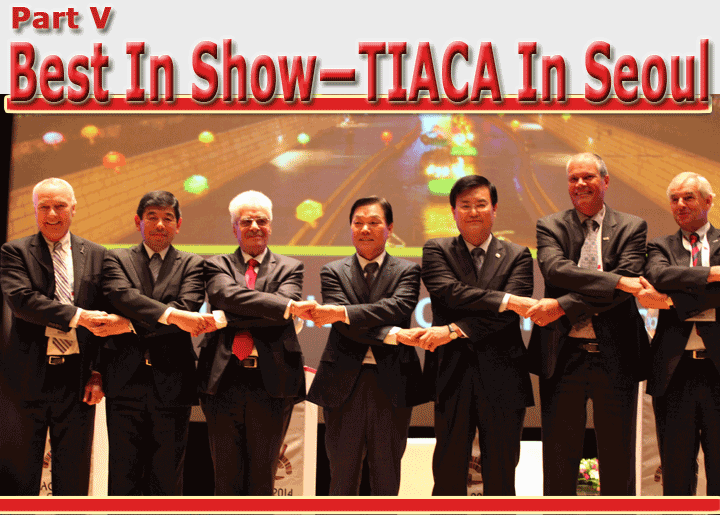 All
Together Now from left TIACA Secretary General Doug Brittin; WCO Secretary
General Kunio Mikuriya; ICAO Secretary General Raymond Benjamin; newly-appointed
President and CEO of Incheon Airport Park Wan-su; Korean Minister of Land,
Infrastructure & Transport, Suh Seoung-hwan; TIACA Chairman Oliver
Evans; TIACA Vice Chairman Enno Osinga. All
Together Now from left TIACA Secretary General Doug Brittin; WCO Secretary
General Kunio Mikuriya; ICAO Secretary General Raymond Benjamin; newly-appointed
President and CEO of Incheon Airport Park Wan-su; Korean Minister of Land,
Infrastructure & Transport, Suh Seoung-hwan; TIACA Chairman Oliver
Evans; TIACA Vice Chairman Enno Osinga.
By
now almost everyone who attended—and the legions of top flight air
cargo companies that refrained from attending—have agreed that TIACA
ACF held in Seoul, Korea, was on many levels less satisfactory than anticipated.
But what about the Air Cargo Forum (ACF),
the sessions in which many well-intentioned and dedicated smart people
came forward and gave it their all?
Here are a few sessions at ACF 2014 that
were overlooked, as FlyingTypers’ exclusive in-depth session
and workshop coverage continues. Analysis of the three leading air cargo
events of the past few months—ACH Milan this past September, TIACA
Seoul held in October, and FIATA Istanbul in November 2014—will
continue throughout early 2015.
You can click back to read our previous
efforts below.
For Part I click here
For Part II click here
For Part III click here
For Part IV click here
Another Opening
Another Show
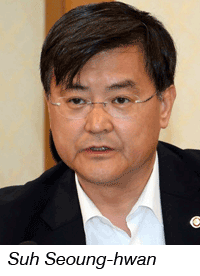 Suh
Seoung-hwan, Minister of Land, Infrastructure & Transport, Korea,
opened the conference with a speech followed by a welcome from Wan-su
Park, the newly appointed president and chairman of ACF-host Incheon Airport. Suh
Seoung-hwan, Minister of Land, Infrastructure & Transport, Korea,
opened the conference with a speech followed by a welcome from Wan-su
Park, the newly appointed president and chairman of ACF-host Incheon Airport.
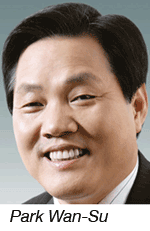 Suh Seoung-hwan said, “Since the successful
bid to host ACF 2014 in 2009, the government has helped in making the
event a success.”
Suh Seoung-hwan said, “Since the successful
bid to host ACF 2014 in 2009, the government has helped in making the
event a success.”
He added, “I hope this event will
serve as a stepping stone for Incheon Airport and the Korean air cargo
market to become a major player in Northeast Asia.”
The conference focused on how the air cargo
industry must work closely with regulators to deliver safe, reliable,
efficient global trade and, given the audience of shippers, forwarders,
GSAs, airlines, airports, industry bodies, and regulatory authorities,
there can be no greater opportunity than ACF to express the views of the
entire spectrum of stakeholders.
“The industry is facing unprecedented
challenges and unprecedented opportunities; we must face them together,”
said TIACA Chairman Oliver Evans.
“Collaboration is key. It is a long
road, but it is an exciting one, and one of which we can be proud.”
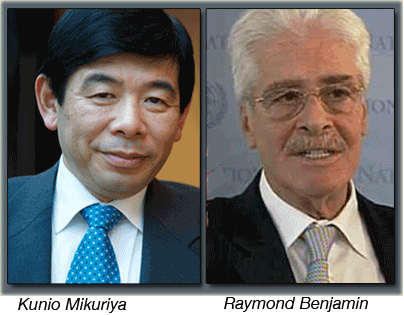 WCO Secretary General Kunio Mikuriya and
ICAO Secretary General Raymond Benjamin also attended the plenary session.
The messages were clear: “Getting information at an early stage,
preferably pre-loading, is vital to deciding what approach is needed to
high-risk cargo,” said Mikuriya. While Benjamin told the audience:
“Air trade is an essential enabler of global connectivity, but we
need to forge practical partnerships and solutions.”
WCO Secretary General Kunio Mikuriya and
ICAO Secretary General Raymond Benjamin also attended the plenary session.
The messages were clear: “Getting information at an early stage,
preferably pre-loading, is vital to deciding what approach is needed to
high-risk cargo,” said Mikuriya. While Benjamin told the audience:
“Air trade is an essential enabler of global connectivity, but we
need to forge practical partnerships and solutions.”
Voice of
the Shipper
Later that day we heard the voice of the
shipper. To lower prices and increase the efficiency of the air cargo
supply chain, forwarders need to improve productivity through collaboration
with governments, carriers, and shippers.
Another common demand from shippers is the
need for greater transparency, reliability, and flexibility—a service
for which many shippers are willing to pay. One shipper commented that
67 percent of his shipments flew as planned and they struggled to deliver
a service based on this level of performance. Furthermore, shippers need
to see up-to-the-minute shipment status, rather than finding out later
that the shipment has been offloaded,
Trade still sees customs as a bottleneck,
with standardization being key to the success of the industry. Once again,
reference was made to benchmarking against the integrator model. It was
also noted that too much standardization could harm air freight’s
flexibility.
It is not all doom and gloom. While air
cargo faces challenges, such as modal competition, and shippers continue
to squeeze their costs, it is still reliable, efficient transport and
will continue to derive benefits from the growing demand for e-commerce
and cold chain.
Workshop
Theme: The recession made the supply chain evolve as companies
struggle to survive. Now it is the norm
to use multi-modal shipping and to tailor the handling and tracking of
the consignment according to its specific needs and the needs of its shipper.
It takes intelligence, a constant exchange of data, and stronger collaboration
between stakeholders. How are shippers handling modal shifts? What other
issues challenge shippers, such as verifying carbon emissions? What can
be done to improve this among partners?
 MODERATOR:
Chris Welsh, Secretary General, Global Shippers’ Forum MODERATOR:
Chris Welsh, Secretary General, Global Shippers’ Forum
Chris introduced the session and stated
that cargo volumes were up 5.1 percent compared to 2013, but demand for
air cargo is growing more slowly than GDP (in previous years air cargo
enjoyed a growth of GDP X 2).
The reasons being:
•
Modal shift to ocean freight;
•
On shoring and near shoring;
•
Strategies to reduce transportation
costs;
•
Shippers commitment to report
emissions and emission reductions.
At a workshop held in Istanbul, shippers
decided they wanted paperless solutions (the perception is that many sea
freight solutions are far ahead of air freight). Shippers believe that
replacing paper-based systems will speed up the process, reduce delays,
and reduce transaction costs.
Shippers also want to know the industry
targets for cost savings and the targets for reducing the end-to-end delivery
times by 24 hours.
Chris asked each of the workshop teams to
focus on deriving solutions for the following:
1.
Increasing transparency and visibility of
costs/surcharges
2.
KPIS for enhanced performance and benchmarking
3.
Greater customer focus
4.
E-commerce solutions
5.
Innovative solutions
6.
Actions for building trust between air cargo industry
and regulators
7.
Developing elements for a reward system for those
who get it right
One group made the point that first the real
customer—the person who places the order and pays the bill—needs
to be identified.
Outputs from the various groups included:
•
Transparency
Some felt that transparency should start
with the freight forwarder. This would act as the catalyst for all to
embrace the concept. Freight forwarders should list all costs and price
options and share with shippers. Direct, proactive communication is required
in case of delays, with more focus on operational excellence.
•
e-Commerce
Another group said that processes needed
to be redesigned with a focus on G2G, including customs, security, airports,
and trade departments. Start with low-hanging fruit where e-commerce is
an accepted way of doing business such as Netherlands and Singapore (and
Dubai?). The industry needs flexible, reliable, and user-friendly systems.
•
KPIs
Freight needs to be:
1.
On time
2.
Intact
3.
Delivered as promised
•
Innovative
Solutions
1.
Pre-clearance of goods to accelerate delivery
and acceptance times
2.
Mutual recognition of trusted trader programs
3.
Data must be entered once and re-used across the
supply chain
•
Rewards
1.
For clean electronic data
2.
Faster service
3.
Accreditation scheme
4.
Increased reliability
In summarizing, Chris stated three of the
suggested solutions had been mentioned in previous shipper forums, including:
service level agreements; KPIs relevant to the customer; and full visibility
of costs consisting of one price (similar to that provided by the integrators)
for the end-to-end service.
Head of Cargo at IT powerhouse CALOGI Patrick
Murray comments:
“Yes to all of the above. I particularly
like the simplified rating idea; this would make it easier to determine
the final price. Fuel price volatility does not help the cause, as airlines
seek to recover costs through additional surcharges. One airline I spoke
to thought simplified rating would indeed be a good idea. If the integrators
are our benchmark, we need to find a solution.
“I am also a firm advocate of pre-clearance,
and wider adoption will be key if we are to achieve the IATA objective
of shaving 48 hours off of the transit time of a shipment.
“Finally, service level agreements
between forwarders/shippers and forwarders/airlines would push transparency.
This is a must-do for the industry.”
Workshop Theme:
Customs and security are essential to the supply chain, but businesses
have traditionally treated both processes as obstacles, instead of colleagues
and partners. Collaboration is vital for all three to fulfill their roles
and push standards ever higher. How can regulators and industry work better
together to share best practices, recognizing regional, as well as global
issues?
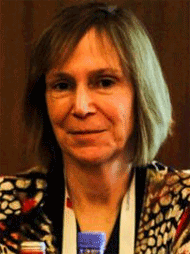 MODERATOR:
Sue Presti, Senior Director of Government Affairs, TIACA. MODERATOR:
Sue Presti, Senior Director of Government Affairs, TIACA.
Sue invited comments from each of the participants
on the above state of affairs. They include the following.
The workshop participants generally felt
that a lot of time has been spent in providing advanced data, but there
is still a long way to go.
There continue to be challenges on both
sides, trade and regulatory, and the ACAS pilot (currently four years
old) identified issues to be resolved. Everyone agreed collaboration is
key to success, and dialogue with the industry needs to continue. In terms
of ACAS, trade submitted many recommendations and several of these have
been taken forward.
Many felt there should be a common standard
for advance data and ideally this should be achieved through joint consensus
between ICAO and WCO, however, many also believed one standard may not
be achievable. As an aside: ICAO and WCO agreed on a joint working group,
and will take the issue of a common standard forward.
Some of the audience felt that this forum
would be a good platform to own the issue and take the leadership. LH
already proposed changes to the WCO SAFE Framework of Standards and these
are going to be adopted.
Meanwhile, security and trade facilitation
are intertwined; however, what works for one government does not work
for another. Mutual recognition of trusted trader programs is also seen
as a must do.
Furthermore, there has been talk of one
global technology platform enabling the submission of data between many
customs authorities; without this the same debate is likely to take place
at TIACA 2016.
Another school of thought was that WCO SAFE
should be the global standard and ICAO/WCO should engage member countries
to agree changes, with only those that are agreed by 100 percent of the
members being taken forward (similar to the way in which the IATA cargo
IMP standard is developed). However, many participants felt this would
not be achievable.
Another participant asked if the security
data that is now required could prevent another ‘Yemen’ incident.
The questioner remained skeptical as to whether the provision of this
data really helps. Several stakeholders
believed that screening helps, but the risk is still there.
Currently 163 million shipments have been
transported as part of the ACAS pilot. The workshop acknowledged that
most of these belong to integrated carriers and SMEs now need to join
the pilot. One participant suggested that
the regulatory authorities should provide help (a system) to SMEs who
do not have the financial resources to invest in systems to generate the
security data.
Another member of the workshop suggested
that to make things simple and quick, trade should define the standards
and share them with the regulatory authorities for implementation. These
standards should be voluntary and not mandated.
One workshop attendee suggested that WCO
and ICAO embark on a campaign to promote the SAFE standards so as to avoid
deviation wherever possible.
All agreed that moving forward, consultation
with key stakeholder groups is key when it comes to providing data to
regulatory authorities.
Geoffrey Comments:
"We agree on the industry-engagement
model for designing and implementing regulatory standards, but one of
the main issues is still who will lead it. I hope the ICAO/WCO partnership
will find some way to resolve this.
"The idea of a common database has
been floated many times before, but who would build this and if there
were several providers, how would the data be exchanged? It will be interesting
to see how this pans out.
"Despite low attendance, our overall
impression of ACF and belief in the importance of a strong and vibrant
TIACA is ever hopeful.
"The dream of TIACA that dates back
to when automotive engineers in the U.S. formed ACF is to provide an opportunity
to meet with many potential customers.
"Many industry leaders did show up
in Seoul, although as has been said again and again, not enough attended,
in our judgment.
"These are the people who have the
power to make things happen. Let’s hope we are still not discussing
the lack of e-AWB penetration and the burden of managing differing advance
security standards at TIACA 2016.
Geoffrey
|





